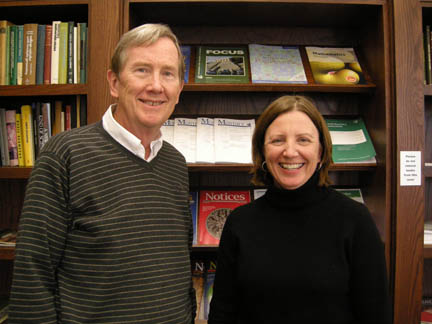
Even as a teenager, Jim Lewis knew two things: He loved learning and he loved mathematics. But he needed more than that to find his way to what would become a very fulfilling career at UNL.
"At this point in my career, I look back and I'm so appreciative of the teachers who inspired me, both in the K-12 school system and at the university - the people who challenged me, not necessarily the people who were in any sense nicest to me or easiest on me, but the people who challenged me the most and helped me learn," he said.
Now in his 40th year as a math professor at UNL, Lewis has lived up to his definition of a good teacher, his students and colleagues say. He has developed a reputation as an inspiring and challenging educator committed to improving mathematics education at UNL and beyond.
For his efforts, he has been selected as the 2010 Carnegie Foundation for the Advancement of Teaching Nebraska Professor of the Year. The award is part of the U.S. Professors of the Year Awards Program, which recognizes dedicated educators who have had a profound impact on the lives of students and contributed significantly to undergraduate education. The Council for the Advancement and Support of Education, better known as CASE, administers the awards program.
Lewis, along with other state and national winners, will be honored today during a ceremony in Washington, D.C.
Listen to an interview with Lewis at http://ucommxsrv1.unl.edu/downloadables/audio/20101118lewis.mp3.
The Carnegie Foundation is an independent policy and research center that aims to encourage and uphold the teaching profession. CASE is an international membership association focused on advancing and supporting educational institutions.
Lewis joined the UNL faculty in 1971 after earning a Ph.D. in mathematics from Louisiana State University. Since 2002 he has served as the director of the Center for Science, Mathematics and Computer Education. In 2009, he was named an Aaron Douglas Professor of Mathematics, which recognizes his sustained and extraordinary levels of teaching excellence and national visibility.
Over the years, he has transformed UNL's math curriculum and persuaded university officials to change entrance requirements from three to four years of high school math. He has received dozens of awards for his skill in the classroom as well as his contributions to his profession and the community.
Lewis has dedicated the last 10 years of his career to preparing K-12 teachers. He credits success in that effort to a strong partnership between UNL's Department of Mathematics and the Department of Teaching, Learning and Teacher Education. He has played a pivotal role in attracting millions of dollars in grants to support the efforts. Among them, was a grant to create the NebraskaMATH program, which he said is the key to realizing a long-term partnership among UNL and Nebraska school districts.
"Jim's work, both through his personal dedication to the learning of his own students and through the far reaching programs he has put in place, has had a huge influence on the lives of hundreds of students," said John Meakin, chair of UNL's math department. "His passion for working to improve the education of teachers continues to have a profound impact on mathematics education throughout our state and beyond."
Lewis' students, meanwhile, say they're grateful for his skill in challenging them to become masters of their discipline and to position them for success. He inspires a love of learning and a desire to have a lasting impact on their own students, they said.
Jana Rowe, who became an elementary school teacher after graduating from UNL in 2003, wrote in her nomination letter that she is forever grateful that Lewis recognized her ability to learn and believed that she had the potential to become a good teacher.
"My only hope is that I may be as dedicated to my students as Dr. Lewis was to me and that I may impact my students' lives to the degree that Dr. Lewis has impacted mine," she wrote.
Lewis called the award a tremendous honor, but one that comes with a duty to continue to "pay it forward."
"It reinforces the idea that with it comes a responsibility to try to give back to the community, my profession (and) the university here," he said.
- Jean Ortiz Jones, University Communications